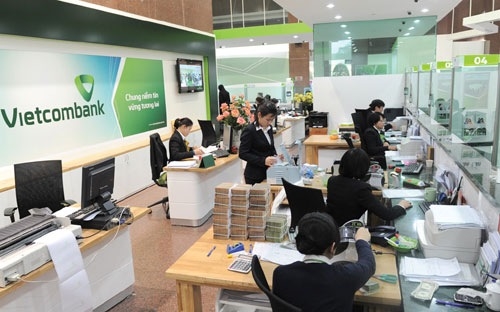 Economy
Economy

Large banks have asked the government to increase the cap for foreign stakeholders in the banks from the current stipulated 30 per cent to more than 40 per cent.
 |
| Vietcombank is proposing to issue new shares equivalent to 10 per cent of its capital to foreign investors. — File Photo |
Viet Nam News HÀ NỘI — Large banks have asked the Government to increase the cap for foreign stakeholders in the banks from the current stipulated 30 per cent to more than 40 per cent.
Vietcombank is proposing to issue new shares equivalent to 10 per cent of its capital to foreign investors. Japan’s Mizuho Corporate Bank Ltd, which owns 15 per cent of the bank, plans to acquire another 5 per cent.
If the proposal is approved, Vietcombank’s foreign ownership will rise to around 35 per cent from the current 21 per cent.
Vietinbank general director Lê Đức Thọ said that the bank would seek permission from the Government to increase ownership for foreign investors at his bank to 40 per cent or even higher. However, the State would still hold the dominant ratio of 51 per cent in the banks, he said.
The rise would help Vietinbank, the country’s second largest lender by assets, to raise its foreign ownership from the current 27.75 per cent to more than 40 per cent.
At the shareholders meeting recently, Sài Gòn Commercial Joint Stock Bank (SCB) general director Võ Tấn Hoàng Văn also announced that the State Bank of Việt Nam allowed the SCB to find foreign strategic investors to sell 50 per cent of the bank’s stakes.
An Binh Bank is also expecting to increase the caps for foreign stakeholders at the bank to 49 per cent. MayBank and IFC are currently among An Binh Bank’s largest shareholders, holding 30 per cent of the bank’s charter capital.
According to experts, the cap increase for foreign stakeholders in local banks is indispensable as it will help the banks improve their restricted finance and governance, and grow rapidly in the context of rising competition from the country’s integration into the world market.
Under the current regulations, cap on foreign holdings in a Vietnamese bank is set at 30 per cent. However, according to experts, the rule makes investment into domestic banks less attractive as foreign investors with low stakes have no say in the decision making process in such banks.
Domestic commercial banks also said that it is hard for them to find foreign strategic partners due to the current rules on foreign ownership limits.
The Bank for Investment and Development of Việt Nam (BIDV), for example, early last year planned to find foreign strategic partners, selling a 15 per cent stake to a foreign strategic partner and 10 per cent to a foreign financial investor. However, it failed in its search.
Another example is Military Bank. After failing to find suitable foreign strategic partners for a long time, the bank recently had to change its plans and decided to increase stakes for foreign investors from 10 per cent to 20 per cent through an additional share issue.
The same trend was seen with VP Bank after its strategic partner - the Singapore-based Overseas Chinese Banking Corporation Limited (OCBC) - withdrew its capital from late 2013. Finding no foreign strategic partners, VP Bank had to ask its shareholders in October 2015 to approve a plan to issue a number of shares, equal to 20 per cent of the bank’s capital, to overseas investors in order to raise capital to serve the bank’s core businesses.
However, to attract foreign strategic partners, besides cap increase of foreign stake holdings, experts also recommended to domestic banks that they improve their transparency.
Deputy Director of the Central Institution for Economic Management Võ Trí Thành said that transparency was a key factor in attracting foreign partners. Transparency must exist at all levels and banks must commit to it, both, in their reporting and operations, he said. — VNS




